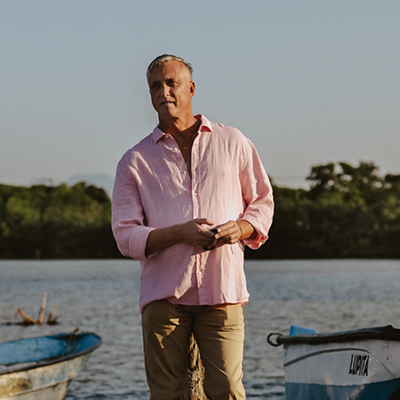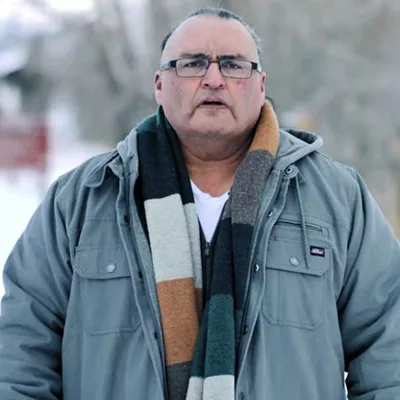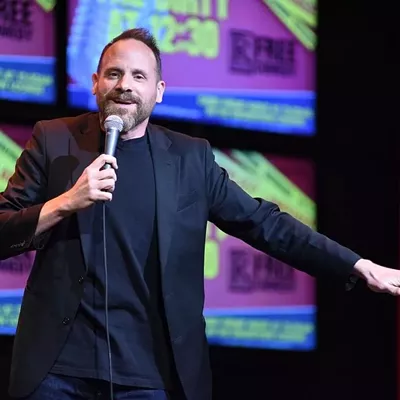"Some people say that the peace movement is akin to trying to herd cats," says Cooper, "a near impossibility. There are so many different groups involved who approach issues from different perspectives; what the Tucson Peace Center tries to do is coalesce those points into a more unified view or vision. War is really an organizing principle of our society right now, and some people are so afraid to consider an alternative to that. It's empowering for people to come together and realize that a lot of people are on the same wavelength, thinking and feeling the same things; it helps them to be less timid, and gives them the courage to speak their heart and mind."
The Tucson Peace Center formed in 1962, focused on opposing the war in Vietnam. Throughout the '70s and '80s, TPC members voiced their opposition to various conflicts--the Middle East, Bosnia, Nicaragua. "We've always been opposed to war being an organizing principle," says Cooper. "We're trying to make peace an organizing principle. Our society is very much involved in war right now, and we feel like we're a balance to that."
The TPC functions as an umbrella organization, with about 60 peace, justice and environmental groups clustered under that umbrella, from the Women's International League for Peace and Freedom to Derechos Humanos. "We want these groups to become aware of each other, and aware of what other groups are doing," says Cooper.
One of the TPC's most successful methods of encouraging communication is via their annual Peace Fair and Music Festival; this year's fair--TPC's 23rd--will take place 11 a.m. to 5 p.m. Saturday, Feb. 26, under the bandshell at Reid Park (near 22nd Street and Country Club Road). Although the Peace Fair is a networking opportunity for the many groups involved in TPC, the fair--featuring live music by Kathleen Williamson, Lisa Otey, The Wayback Machine; kids' activities; food booths; raffles, prizes and more--is very much about the community at large, allowing individuals to enjoy a Saturday outdoors while learning about organizations they might want to get involved in. After all, most activists aren't born that way--they evolve.
"I've been in Tucson for 48 years," says Cooper. "I love this community, and I wanted to give back." But even President Cooper hasn't always been an activist.
"Through Sept. 11, many of us were changed dramatically," he says, drawing a deep breath. "I was particularly moved by the families of Sept. 11 victims whose motto was, 'Our grief is not a cry for war.' It so moved me that these people who were directly affected by the events were so compassionate and had such a spiritual point of view that transcended others' cries for violence and retribution. It moved me so much that it made me want to do something locally, for the community, (to) help to raise consciousness here."
Cooper got involved with the Women in Black--who mark the tragedy of war and violence by standing on the corner of Speedway Boulevard and Euclid Avenue at 5 p.m. every Friday--and met the activist community through that group, eventually discovering the TPC in 2001. A few years later, he became the center's president, committed to a three-year term. Within those years, Cooper hopes to find a home for the center. "We've been homeless for 43 years," he says. "People say, 'Where is the center?' and all I can do right now is point to my heart and say, 'In here.' But we do hope to have a home one day soon, where we can hold meetings, events, distribute information."
When I ask Cooper whether the activist community felt discouraged in the wake of the most recent presidential elections, he sighs heavily before saying, "Many of us, myself included, were very disappointed with the outcome of the election. There was a lot of despondency, frustration, anger, leading people to think, 'Maybe I want to give up. It's pointless to try.' And yet I don't give up, because I'm an optimist at heart, because I want to do the best I can today to see the changes I want to see. And the people around me have not given up--I think they've re-committed themselves on a deeper level to effect change.
"When Barbara Kingsolver spoke at the Loft," he continues, "one of the things she said was that it took women 150 years to get the right to vote; it didn't happen in a generation, or in two or three generations. Those who started the movement had to realize that the change might not happen in their lifetime, that it was for future generations--for the long run. That's how I feel."
Admission to the fair is free; call 620-1349 or visit www.peacecalendar.org for additional information.







